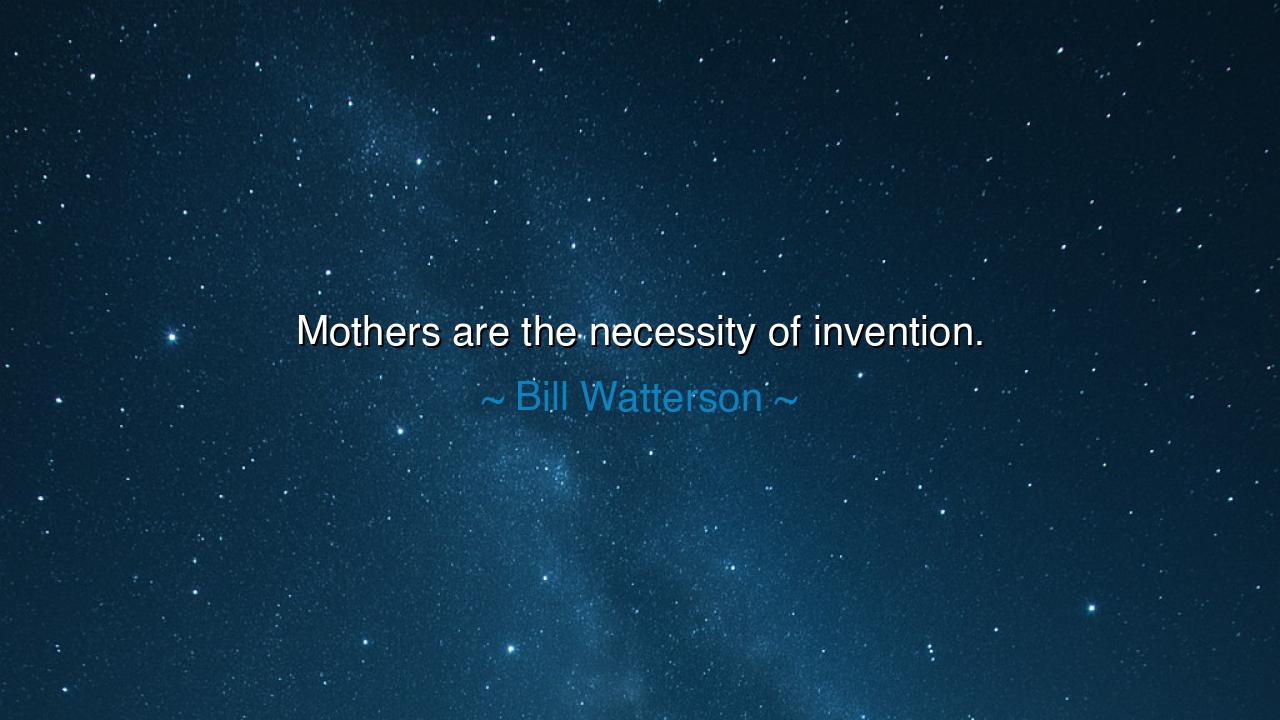
Mothers are the necessity of invention.






Hearken, O seekers of wisdom, to the words of Bill Watterson, creator of Calvin and Hobbes, who once declared: “Mothers are the necessity of invention.” With wit and subtle truth, he reversed the old adage, “Necessity is the mother of invention,” to reveal something profound about the nature of motherhood, creativity, and resilience. Beneath the humor lies a radiant truth — that it is often the mother herself who becomes the source of ingenuity, the quiet architect of solutions, born not from ambition, but from love and necessity combined.
In the ancient rhythm of life, every mother has been both nurturer and innovator. From the dawn of civilization, the mother’s hands have devised new ways to clothe, to feed, to comfort, and to heal. When the child cries, when hardship looms, when the world withholds its ease — it is the mother’s imagination, sharpened by care, that bends reality to serve the fragile life in her keeping. Thus, Watterson’s saying reminds us that mothers are not merely caretakers; they are the first inventors, the first engineers of survival, and the first poets of practical wisdom.
Consider the story of Nancy Edison, the mother of the great inventor Thomas Edison. When young Thomas was expelled from school for being “unfit for learning,” his mother refused to accept defeat. She withdrew him from the institution and taught him at home, shaping his mind with patience, curiosity, and faith. From her devotion sprang the genius that would one day light the world. In this way, the saying comes alive: a mother’s courage and creativity gave birth to invention itself, not through machines or laboratories, but through love, faith, and resourcefulness.
The ancients, too, understood this sacred role. In every myth and legend, the mother is not passive but transformative. Isis of Egypt gathered the broken pieces of her husband Osiris and resurrected life itself. Demeter of Greece, in her grief, gave rise to the cycles of the earth — sowing, death, and rebirth. These stories mirror the daily acts of mothers in every age: from the ashes of struggle, they bring forth life, adaptation, and creation. Thus, in every household and every era, the mother stands as the necessity of invention, for it is her will that ensures continuity even when the world falls apart.
Yet Watterson’s words carry more than praise; they carry humor and humility. They remind us that the mother’s ingenuity is often born of exhaustion, chaos, and love’s endurance. She invents not to gain glory, but because life demands it. A mother who fashions a toy from scraps to quiet her child, who mends broken hearts with stories, who improvises dinners from near-empty cupboards — she is an artist of survival. Her inventions are rarely written in history books, yet they shape the world more deeply than any empire or machine.
The lesson that emerges is radiant and timeless: love is the greatest catalyst of creativity. When the heart is compelled by compassion, it transcends obstacles and finds solutions unseen by the logical mind. This is the secret of the mother’s art — her capacity to create, not out of luxury or leisure, but from necessity guided by affection. The greatest inventions of the human spirit — patience, empathy, endurance — have always been forged in the fires of her daily sacrifices.
Practical wisdom flows from this teaching: in your own life, approach every challenge with the same heart a mother brings to her child’s cry — not with despair, but with creativity, humor, and care. Let necessity inspire innovation, and let love shape invention. Recognize the motherly force within all acts of creation, for it is that energy which gives rise to civilization itself.
And so, let Watterson’s words echo through time: “Mothers are the necessity of invention.” For it is through the mother’s boundless adaptability that the impossible becomes possible, through her tenderness that endurance is born, and through her imagination that life itself continues to renew. She is not merely a symbol of love — she is the eternal engine of creation, the quiet inventor behind the triumph of humankind.






AAdministratorAdministrator
Welcome, honored guests. Please leave a comment, we will respond soon